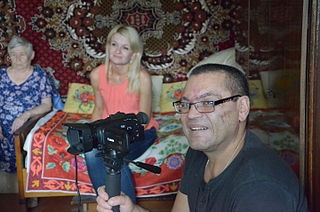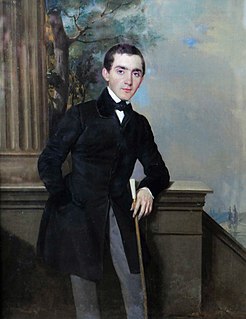Akhmed Halidovich Zakayev is a former Deputy Prime Minister and Prime Minister of the unrecognised Chechen Republic of Ichkeria (ChRI). He was also the Foreign Minister of the Ichkerian government, appointed by Aslan Maskhadov shortly after his 1997 election, and again in 2006 by Abdul Halim Sadulayev. During the First Chechen war Zakayev took part in the battles for Grozny and other military operations, as well as in high-level negotiations with the Russian side.

Akhmad Abdulkhamidovich Kadyrov, also spelled Akhmat, was the Chief Mufti of the Chechen Republic of Ichkeria in the 1990s during and after the First Chechen War. At the outbreak of the Second Chechen War he switched sides, offering his service to the Russian government, and later became the President of the Chechen Republic from 5 October 2003, acting as head of administration since July 2000.

On 19 August 2002, a group of Chechen separatists armed with a man-portable air-defense system brought down a Russian Mil Mi-26 helicopter in a minefield, which resulted in the death of 127 Russian soldiers in the greatest loss of life in the history of helicopter aviation. It was also the most deadly aviation disaster ever suffered by the Russian Armed Forces, as well as its worst loss of life in a single day since 1999.

Andrei Babitsky is a Russian journalist and war reporter, who worked for Radio Liberty from 1989 to 2014, covering the 1991 August Coup, Civil War in Tajikistan and, most notably, both the First and Second Chechen Wars from behind Chechen lines. Babitsky is most famous for his kidnapping by the Russian forces in January–February 2000 during the Second Chechen War and his 2005 video interview with Chechen warlord Shamil Basayev.

In Chechnya, mass graves containing hundreds of corpses have been uncovered since the beginning of the Chechen wars in 1994. As of June 2008, there were 57 registered locations of mass graves in Chechnya. According to Amnesty International, thousands may be buried in unmarked graves including up to 5,000 civilians who disappeared since the beginning of the Second Chechen War in 1999. In 2008, the largest mass grave found to date was uncovered in Grozny, containing some 800 bodies from the First Chechen War in 1995. Russia's general policy to the Chechen mass graves is to not exhume them.
The article details notable human rights violations committed by the warring sides during the second war in Chechnya. Both Russian officials and Chechen rebels have been regularly and repeatedly accused of committing various war crimes, including kidnapping, torture, murder, hostage taking, looting, rape, beheading and assorted other breaches of the law of war.
Sergei (Sergey) Lapin, also known by his radio communications call sign Kadet ("Cadet"), is a former Russian police officer who had served in Grozny, Chechnya as a Lieutenant in the OMON from the Khanty–Mansi Autonomous Okrug. He has been convicted for the torture and "disappearance" of a Chechen student.

The Battle for Height 776, part of the larger Battle of Ulus-Kert, was an engagement in the Second Chechen War that took place during fighting for control of the Argun River gorge in the highland Shatoysky District of central Chechnya, between the villages of Ulus-Kert and Selmentausen.

Pyotr Zakharovich Zakharov-Chechenets was a Russian painter of Chechen origin. He is believed to be the only professional painter of Chechen origin in the 19th century.

The Presidential Palace in Grozny was a building in the center of the Chechen capital Grozny. The building became a symbol of resistance for the supporters of the Chechen Republic of Ichkeria during the early stages of the conflict in Chechnya. The building was ruined by repeated artillery and air strikes. The Russians demolished it in 1996.
Zelimkhan Murdalov was a student from Grozny, Chechnya, who left his home on January 2, 2001, saying he would return but never did. His parents tracked him down at the police station, where an official promised that he would soon be released, but they have not seen their son since. According to witnesses, Murdalov was subsequently severely tortured while in police custody. His case was first brought to the public prominence by the September 2001 Novaya Gazeta article "The Disappearance" by Anna Politkovskaya.

Viktor Alekseyevich Popkov was a Russian dissident, Christian, humanitarian, human rights activist and journalist.

Natalya Khusainovna Estemirova was a Russian human rights activist and board member of the Russian human rights organization Memorial. Estemirova was abducted by unknown persons on 15 July 2009 around 8:30 a.m. from her home in Grozny, Chechnya, as she was working on "extremely sensitive" cases of human rights abuses in Chechnya. Two witnesses reported they saw Estemirova being pushed into a car shouting that she was being abducted. Her remains were found with bullet wounds in the head and chest area at 4:30 p.m. in woodland 100 metres (330 ft) away from the federal road "Kavkaz" near the village of Gazi-Yurt, Ingushetia.

Yelena Vasiliyevna Masyuk is a Russian television journalist known for her coverage of the First and Second Chechen Wars.
Musa Muradov is an ethnic Chechen Russian journalist. In 2003, he was awarded the International Press Freedom Award of the Committee to Protect Journalists for his reporting on the Second Chechen War.
Groznensky Rabochy was a Russian weekly newspaper based in Grozny, Chechnya from 1917 to 1992, and from 1994 to 2001.
The Disappearance of Ali Astamirov concerns a Chechen journalist who was working for Agence France Presse in Ingushetia, Russia, bordering Chechnya, when he was kidnapped at gunpoint by a group of three, uniformed, masked men on 4 July 2003, just outside Nazran. This was during the Second Chechen War.














